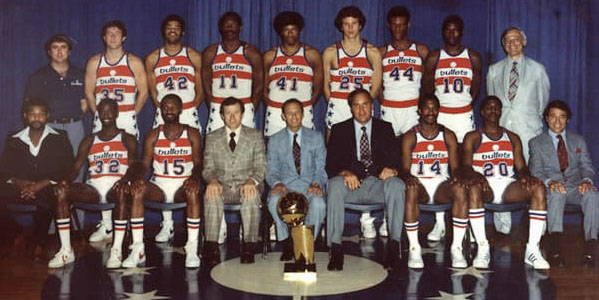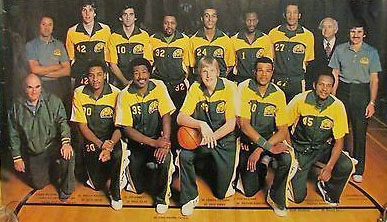Since the last Game 7 in 1974, the NBA had expanded by four teams thanks to the merger with the American Basketball Association: New Jersey Nets, San Antonio Spurs, Washington Bullets, Denver Nuggets, and Indiana Pacers. In addition, the New Orleans Jazz were added as an expansion team.
- As a result, an extra round was added to the playoffs.
- The four division winners got a bye into the conference finals.
- The next four teams in each conference met in best two-of-three series.
The Pacific Division proved to be by far the strongest division.
- Each team finished at least four games over .500.
- As a result, three of the four Western Division first round slots were filled with Pacific Division teams.
- The Seattle Supersonics, who finished third in the regular season in the Pacific, upended the Portland Trail Blazers, who won the Pacific by nine games, in the conference semifinals.
Neither Eastern Conference division winner made it to the finals either.
- The Washington Bullets, second by eight games in the Central Division, upended division winning San Antonio in the semifinals.
- Then Washington knocked off the 76ers, the Atlantic Division champs, in the finals.
Both finalists came on strong the second half of the season.
- The Bullets were in their second season under Coach Dick Motta, "a little guy with a lot of intensity" who had coached the Chicago Bulls from 1968-1976, including four straight 50-win seasons.
- His hiring was condemned by fans and players alike. PF Elvin Hayes, accustomed to being the center of the offense, said he'd rather retire than play for a coach like Motta. The Washington fans booed the new coach from his very first game.
- Dick's problem? He stressed relentless defense and running a pattern-based offense. He also brought an attitude of "my way or the highway" to his job.
- Hayes didn't retire and eventually both strong-willed men compromised for the good of the team. Elvin recalled years later, "Dick demanded a lot of his players. He demanded a lot of himself. He gave us a direction, and we followed it."
- Washington had the same record, 48-34, in Motta's first year as they had the previous season under K. C. Jones. The '76-77 Bullets lost in the Eastern Semifinals to the Houston Rockets.
The Bullets actually finished four games worse in 1978: 44-38. However, Motta had assembled a team that could survive the pressures of the playoffs.
- The key offseason move was the signing of free agent SF Bob Dandridge, who had averaged 20-21ppg for Milwaukee the last two years of his eight year tenure as a Buck.
- Dandridge's arrival allowed Motta to move Kevin Grevey to his natural position of off guard, where he increased his scoring average from 6.9 to 15.5ppg.
- 6'7" 245lb C Wes Unseld was a good fit for Motta's offense. A better rebounder than scorer, he was known for his bone-shattering picks. "What we needed was an iron hand," said Unseld about the new coach.
- The final piece to the puzzle was backup G Charles Johnson, who was acquired in January. He became the "glue man" for the Bullets' impressive second team, some of whom would have been starters on other teams. Motta regularly played ten men, a strategy that would pay off in the gruelling playoffs.
- Hayes' points per game decreased from 23.7 in '77 to 19.7, but his rebounding went up on both ends of the court.
The Portland Trail Blazers had the best record in the league at 58-24.
- However, the defending champions were struck by a series of critical injuries, starting with a bad left foot for star C Bill Walton.
- As a result, the Blazers lost 14 of their last 22 games and lost in the conference semifinals to Seattle in six games.
The Supersonics' season was the reverse of Portland's.
- They started terribly, losing 17 of the first 22 games to cause the firing of Coach Bob Hopkins.
- Lenny Wilkens took over and led Seattle to 42 victories in their last 60 games.
The Sonics were a good mixture of rookies and veterans.
- Three of the four top scorers were guards Gus Williams (18.1ppg), "Downtown" Freddie Brown (16.6), and Dennis Johnson (12.7).
- 7'1" C Marvin Webster, the "Human Eraser," led in blocked shots with 2.0 per game.
- 13-year veteran Paul Silas manned one forward position while 6'11" rookie Jack Sikma quickly became a fan favorite at the other frontcourt spot.
- Like Washington, Seattle had a deep bench with nine players averaging 23 or more minutes per game.
FINAL STANDINGS
Eastern Conference |
Atlantic Division
| Team |
W |
L |
% |
GB |
| Philadelphia 76ers |
55 |
27 |
.671 |
-- |
| New York Knicks |
43 |
39 |
.524 |
12 |
| Boston Celtics |
32 |
50 |
.390 |
23 |
| Buffalo Braves |
27 |
55 |
.329 |
28 |
| New Jersey Nets |
24 |
58 |
.293 |
31 |
|
Central Division
| Team |
W |
L |
% |
GB |
| San Antonio Spurs |
52 |
30 |
.634 |
-- |
| Washington Bullets |
44 |
38 |
.537 |
8 |
| Cleveland Cavaliers |
43 |
39 |
.524 |
9 |
| Atlanta Hawks |
41 |
41 |
.500 |
11 |
| New Orleans Jazz |
39 |
43 |
.476 |
13 |
| Houston Rockets |
28 |
54 |
.341 |
24 |
|
Western Conference |
Midwest Division
| Team |
W |
L |
% |
GB |
| Denver Nuggets |
48 |
34 |
.585 |
-- |
| Milwaukee Bucks |
44 |
38 |
.537 |
4 |
| Chicago Bulls |
40 |
42 |
.488 |
8 |
| Detroit Pistons |
38 |
44 |
.463 |
10 |
| Kansas City Kings |
31 |
51 |
.378 |
17 |
| Indiana Pacers |
31 |
51 |
.378 |
17 |
|
Pacific Division
| Team |
W |
L |
% |
GB |
| Portland Trail Blazers |
58 |
24 |
.707 |
-- |
| Phoenix Suns |
49 |
33 |
.598 |
9 |
| Seattle Supersonics |
47 |
35 |
.573 |
11 |
| Los Angeles Lakers |
45 |
37 |
.549 |
13 |
| Golden State Warriors |
43 |
39 |
.524 |
15 |
|
Eastern Conference First Round
Bullets over Hawks 2-0
Knicks over Cavaliers 2-0 |
Western Conference First Round
Bucks over Suns 2-0
Supersonics over Lakers 2-1 |
Eastern Conference Semifinals
Bullets over Spurs 4-2
76ers over Knicks 4-0
|
Western Conference Semifinals
Nuggets over Bucks 4-3
Supersonics over Trail Blazers 4-2 |
Eastern Conference Finals
Bullets over 76ers 4-2 |
Western Conference Finals
Supersonics over Nuggets 4-2 |
Motta became famous during the playoffs for a phrase he applied to basketball.
- "The opera isn't over 'til the fat lady sings" was used by sportswriter/broadcaster Dan Cook after the Spurs won the opening game of the semifinal series against the Bullets. Coach Motta picked up the phrase and used it repeatedly when his team faced challenges during their run to the finals.
- The Bullets never lost two games in a row during the playoffs as they knocked off the Hawks 2-0 in the opening round, the Spurs in six in the semifinals, and the 76ers in six in the conference finals.
- As he had been all season, Hayes was Washington's leading scorer and leading rebounder in the playoffs.
Seattle's road to the finals mirrored Washington's.
- The Supersonics also didn't have to go to a seventh game to win the Western Division.
- They likewise never lost two games in a row.
- Their leading scorer and rebounder during the season, Gus Williams and Marvin Webster respectively, led them in both categories during the playoffs.
CBS couldn't have been happy with the pairing of Washington and Seattle in the finals. However, the fans in the two cities were ecstatic at their teams' appearance in the finals.
1974 SEATTLE SUPERSONICS
| # |
Player |
Pos. |
Hgt. |
Wgt. |
College |
Exp. |
| 1 |
Gus Williams |
PG |
6-2 |
175 |
USC |
3 |
| 10 |
Joe Hassett |
SG |
6-5 |
180 |
Providence |
1 |
| 24 |
Dennis Johnson |
SG |
6-4 |
185 |
Pepperdine |
2 |
| 27 |
John Johnson |
SF |
6-7 |
200 |
Iowa |
8 |
| 30 |
Al Fleming |
SF |
6-7 |
215 |
Arizona |
1 |
| 32 |
Fred Brown |
SG |
6-3 |
180 |
Iowa |
6 |
| 35 |
Paul Silas |
PF |
6-7 |
220 |
Creighton |
14 |
| 40 |
Marvin Webster |
C |
7-1 |
225 |
Morgan State |
3 |
| 42 |
Wally Walker |
SF |
6-7 |
190 |
Virginia |
2 |
| 43 |
Jack Sikma |
C |
6-11 |
230 |
Illinois Wesleyan |
1 |
| 45 |
Bruce Seals |
SF |
6-8 |
210 |
Xavier (LA) |
5 |
| Coach: Lenny Wilkens |
1974 WASHINGTON BULLETS
| # |
Player |
Pos. |
Hgt. |
Wgt. |
College |
Exp. |
| 10 |
Bob Dandridge |
SF |
6-6 |
195 |
Norfolk State |
8 |
| 11 |
Elvin Hayes |
PF |
6-9 |
235 |
Houston |
10 |
| 14 |
Tom Henderson |
PG |
6-3 |
190 |
Hawaii |
4 |
| 15 |
Charles Johnson |
SG |
6-0 |
170 |
California |
6 |
| 20 |
Phil Walker |
SG |
6-3 |
180 |
Millersville |
1 |
| 25 |
Mitch Kupchak |
PF |
6-9 |
230 |
North Carolina |
2 |
| 32 |
Larry Wright |
PG |
6-1 |
160 |
Grambling |
2 |
| 35 |
Kevin Grevey |
SF |
6-5 |
210 |
Kentucky |
3 |
| 41 |
Wes Unseld |
C |
6-7 |
245 |
Louisville |
10 |
| 42 |
Greg Ballard |
SF |
6-7 |
215 |
Oregon |
1 |
| 44 |
Joe Pace |
C |
6-10 |
220 |
Coppin State |
2 |
| Coach: Bob Hopkins |
RESULTS OF FIRST SIX GAMES
| # |
Date |
Place |
Winner |
Loser |
Winning Team
High Scorer |
Losing Team
High Scorer |
| 1 |
May 21 |
Seattle |
Sonics 106 |
Bullets 102 |
Brown 30 |
Grevey 27 |
| 2 |
May 25 |
Washington |
Bullets 106 |
Sonics 98 |
Dandridge 34 |
Williams 24 |
| 3 |
May 28 |
Washington |
Sonics 93 |
Bullets 92 |
Webster/Williams 20 |
Hayes 29 |
| 4 |
May 30 |
Seattle |
Bullets 120 |
Sonics 116 |
Dandridge 23 |
D. Johnson 33 |
| 5 |
June 2 |
Seattle |
Sonics 98 |
Bullets 94 |
Brown 26 |
Grevey 22 |
| 6 |
June 4 |
Washington |
Bullets 117 |
Sonics 82 |
Hayes 21 |
Brown 17 |
|
The teams alternated wins through the first six games.
- Game One: The visiting Bullets led by as many as 19 and were still on top 84-73 at the end of the third period. But with Paul Silas putting the clamps on Elvin Hayes in the last quarter, Freddie Brown got hot and scored 16 of his 30 points in the last nine minutes to spark the Seattle comeback win 106-102.
- Game Two: Wes Unseld, who had been criticized for his performance in Game One (10 points and only seven rebounds), led everyone with 15 rebounds and set picks that opened space for Bob Dandridge to score 34 and Hayes to hit 25.
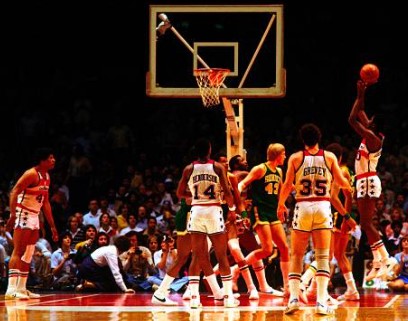 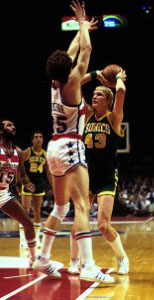
Game 2 Action: Bob Dandridge shoots and Jack Sikma tries to shoot over Charles Johnson.
- Game Three: The game was nip-and-tuck the entire way, with neither team leading by more than two points at the end of any quarter. Webster outscored Unseld 20-2, and Gus Williams added 20 more. John Johnson stifled Kevin Grevey on the perimeter, holding him to an embarrassing 1-for-14.
- Game Four: With the Seattle Arena being used for a mobile home show, the game drew 39,457 to the Kingdome - a record crowd for the NBA finals. The Sonics led at the end of the first quarter and the half and increased the lead to 15 points with two minutes left in the third period. But the Bullets guards, who had been outscored 43-15 in the first half, led a comeback. They were aided by Dennis Johnson going to the bench for six minutes after taking an elbow to the ribs. Washington took the lead 103-101 with 3 1/2 minutes left. Dennis returned and made up for lost time, tying the game with a field goal, picking up loose balls, blocking a shot, and getting an offensive rebound to push the Sonics ahead 104-103. The visitors retook the lead, but Seattle tied the game at 106 on another long shot by Downtown Brown. In overtime, Charles Johnson hit three quick shots, and the Bullets evened the series again 120-116.
- Game Five: Returning to the Coliseum, the Supersonics pulled out a four-point win behind Brown's 26 points and Dennis Johnson's 24. The Bullets did themselves no favors by missing 11 of 20 free throw attempts in the second half.
- Game Six: Their backs to the wall, the Bullets took control by doubling the Sonics in the second quarter 28-14 on their way to a 117-82 rout.
 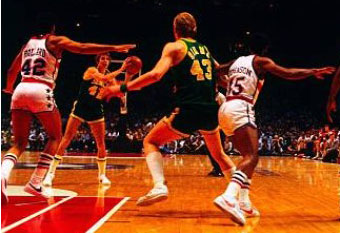
Game 6 action Game Seven
14,008 took their seats, the vast majority expecting the Sonics to win their 23rd consecutive game in that building.
- Quarter 1
The Bullets picked up where they left off in Game 6, moving quickly to a 6-2 lead. Kevin Greevey, suffering with a sprained left wrist, started but again gave way to Charlie Johnson. The veteran reserve would score 19 points, including nine in the pressure-packed final period. The lead changed hands nine times in the first quarter.
Two Unseld free throws with 2:38 left in the period put Washington ahead 22-21. No one would have guessed that the Bullets would not relinquish the lead the rest of the game.
Bullets 31 Supersonics 28
- Quarter 2
After shooting only 25% during the period, the Sonics were fortunate to be only eight points behind. Hard work on the boards, especially the offensive glass, kept them in contention. Dandridge with 12 and Unseld with 11 led the Washington scoring.
Bullets 53 Supersonics 45
- Quarter 3
Seattle went to their four front-court men alignment to start the second half. That alignment had worked well for them late in Game 6. But they used it only briefly before returning to a normal two-guard setup. Whatever their alignment, the Sonics' shooting woes continued. The Bullets outshot them 58% to 33% to build their biggest lead of 13 at the end of the quarter. Elvin Hayes picked up his fifth foul with 5:53 to go and sat out the rest of the period. The Sonics immediately outscored the Bullets 8-2 to cut the lead to 64-59 with 3:59 to go. But the visitors responded with a 15-7 run to end the period, culminating with Johnson's 50' heave that hit nothing but the bottom of the net at the buzzer. Charles did not smile and did not raise his arms in braggadocio. There were still 12 minutes to play.
Bullets 79 Supersonics 66
- Quarter 4
The Sonics slowly cut into the deficit. They were helped when
Hayes fouled out with eight minutes to go. He had expressed his displeasure with several of the calls.
Fred Brown hit a 12' baseline jumper to slash the deficit to 98-94. Then came perhaps the key sequence of the game. Charlie Johnson, who pitched in nine fourth-quarter points, shot a 25' air ball. Sikma and Webster had a chance to grab it, but Henderson dove on the floor and knocked the ball to Kupchak, who scooped it up, laid it in, and was fouled by Webster. He made the foul shot to make it 101-94 with 90 seconds to go. "I was just standing there, and the ball bounced through Webster's legs," said Kupchak. "I just laid it in." "That was a big play for Washington," said Coach Wilkens. "It was a super play on Kupchak's part. Things were going well until then." The three-point play gave Kupchak 18 of Washington's last 20 points.
Just when Bullets fans were planning their victory celebrations, the Sonics scored the next five points. Brown sank a free throw and hit a bank shot.
Then Unseld, a 54% free throw shooter, was fouled with 32 seconds left and missed both shots. Silas put back a Brown miss to pare the margin to 101-99 with 18 seconds to go. The Sonics fouled Unseld again. In a three-to-make-two situation, he missed the first but made the next two to push the lead back to four. "I just stand up there and shoot and hope they go in," said Wes.
Dennis Johnson rushed a jumper that missed, and Dandridge sprinted downcourt for a coup-de-grace dunk to move the final margin to six. As he did so, Charles Johnson finally starting whooping in celebration of the first major sports championship for the Washington DC metropolitan area in 36 years.
FINAL: Bullets 105 Supersonics 99
|

Dick Motta
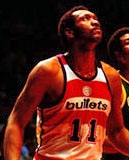
Elvin Hayes
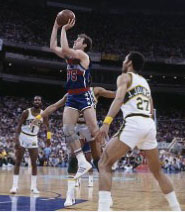
Kevin Grevey shoots.

Charles Johnson
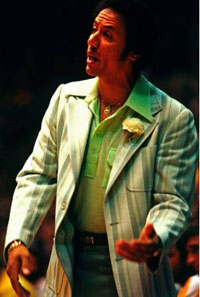
Lenny Wilkens
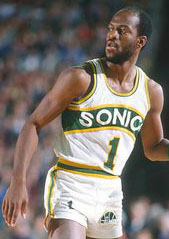
Gus Williams
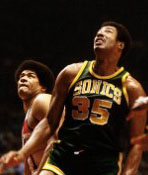
Paul Silas
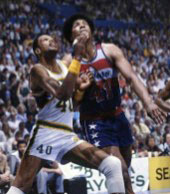
Marvin Webster and Wes Unseld battle for rebounds every game.
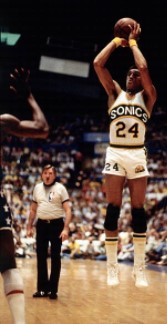
Dennis Johnson shoots in Game 1.
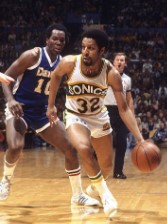
Fred Brown dribbles around Bob Dandridge in Game 3.

Dennis Johnson fights for a rebound in Game 4.

John Johnson shoots in Game 5.
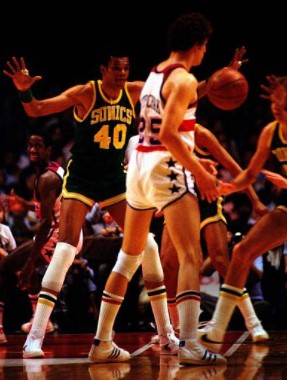
Webster guards Kupchak.
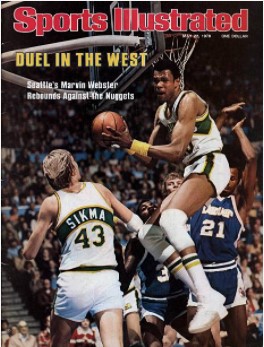 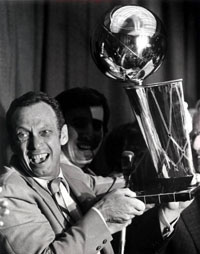
Motta with trophy

Hayes and Dandridge exult
|




















